高中英语巩固练习-高考总复习:过去进行时、过去完成时、过去将来时的用法及区别
- 格式:doc
- 大小:62.00 KB
- 文档页数:7
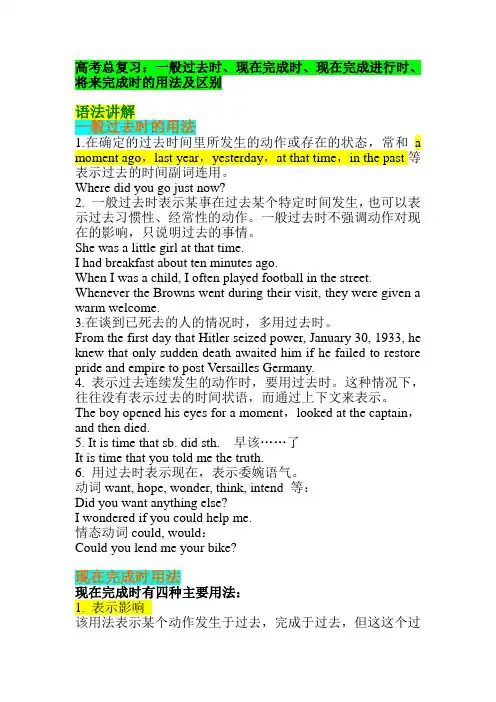
高考总复习:一般过去时、现在完成时、现在完成进行时、将来完成时的用法及区别语法讲解一般过去时的用法1.在确定的过去时间里所发生的动作或存在的状态,常和a moment ago,last year,yesterday,at that time,in the past等表示过去的时间副词连用。
Where did you go just now?2. 一般过去时表示某事在过去某个特定时间发生,也可以表示过去习惯性、经常性的动作。
一般过去时不强调动作对现在的影响,只说明过去的事情。
She was a little girl at that time.I had breakfast about ten minutes ago.When I was a child, I often played football in the street. Whenever the Browns went during their visit, they were given a warm welcome.3.在谈到已死去的人的情况时,多用过去时。
From the first day that Hitler seized power, January 30, 1933, he knew that only sudden death awaited him if he failed to restore pride and empire to post Versailles Germany.4. 表示过去连续发生的动作时,要用过去时。
这种情况下,往往没有表示过去的时间状语,而通过上下文来表示。
The boy opened his eyes for a moment,looked at the captain,and then died.5. It is time that sb. did sth. 早该……了It is time that you told me the truth.6. 用过去时表示现在,表示委婉语气。
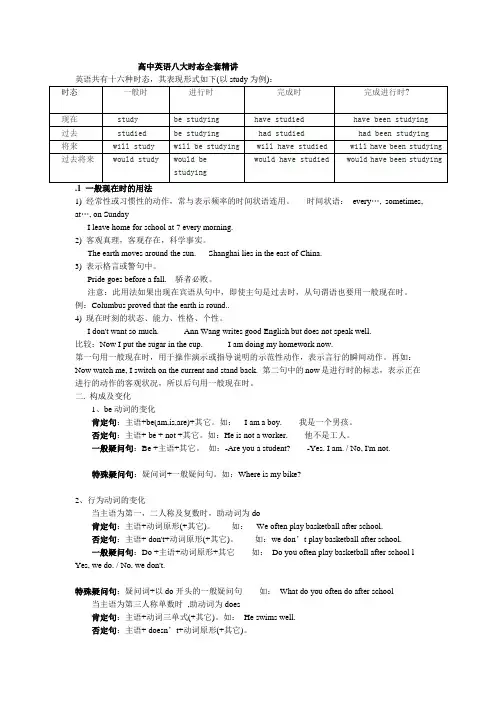
高中英语八大时态全套精讲英语共有十六种时态,其表现形式如下(以study为例):.1 一般现在时的用法1) 经常性或习惯性的动作,常与表示频率的时间状语连用。
时间状语:every…, sometimes, at…, on SundayI leave home for school at 7 every morning.2) 客观真理,客观存在,科学事实。
The earth moves around the sun.Shanghai lies in the east of China.3) 表示格言或警句中。
Pride goes before a fall.骄者必败。
注意:此用法如果出现在宾语从句中,即使主句是过去时,从句谓语也要用一般现在时。
例:Columbus proved that the earth is round..4) 现在时刻的状态、能力、性格、个性。
I don't want so much. Ann Wang writes good English but does not speak well.比较:Now I put the sugar in the cup.I am doing my homework now.第一句用一般现在时,用于操作演示或指导说明的示范性动作,表示言行的瞬间动作。
再如:Now watch me, I switch on the current and stand back. 第二句中的now是进行时的标志,表示正在进行的动作的客观状况,所以后句用一般现在时。
二. 构成及变化1、be动词的变化肯定句:主语+be(am,is,are)+其它。
如:I am a boy.我是一个男孩。
否定句:主语+ be + not +其它。
如:He is not a worker.他不是工人。
一般疑问句:Be +主语+其它。
如:-Are you a student?-Yes. I am. / No, I'm not.特殊疑问句:疑问词+一般疑问句。
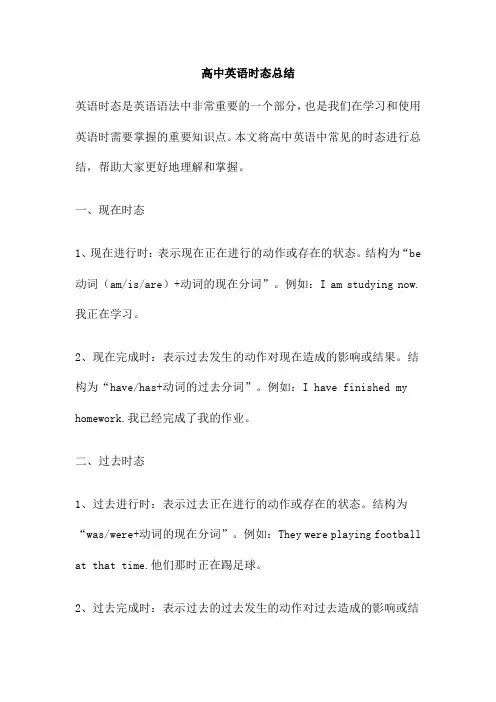
高中英语时态总结英语时态是英语语法中非常重要的一个部分,也是我们在学习和使用英语时需要掌握的重要知识点。
本文将高中英语中常见的时态进行总结,帮助大家更好地理解和掌握。
一、现在时态1、现在进行时:表示现在正在进行的动作或存在的状态。
结构为“be 动词(am/is/are)+动词的现在分词”。
例如:I am studying now.我正在学习。
2、现在完成时:表示过去发生的动作对现在造成的影响或结果。
结构为“have/has+动词的过去分词”。
例如:I have finished my homework.我已经完成了我的作业。
二、过去时态1、过去进行时:表示过去正在进行的动作或存在的状态。
结构为“was/were+动词的现在分词”。
例如:They were playing football at that time.他们那时正在踢足球。
2、过去完成时:表示过去的过去发生的动作对过去造成的影响或结果。
结构为“had+动词的过去分词”。
例如:They had finished their work before we arrived.他们在我们到达之前已经完成了他们的工作。
三、将来时态1、将来进行时:表示将来某个时间正在进行的动作或存在的状态。
结构为“will+be动词+动词的现在分词”。
例如:I will be studying at 9 o’clock tomorrow.我明天9点将会在学习。
2、将来完成时:表示将来某个时间已经完成的动作或达到的状态。
结构为“will+have+动词的过去分词”。
例如:I will have finished my homework by 10 o’clock tonight.我将在今晚10点之前完成我的作业。
以上是高中英语中常见的时态总结,希望能够帮助大家更好地理解和掌握英语时态。
需要注意的是,不同的时态有着不同的用法和结构,大家在使用时需要根据语境选择合适的时态。
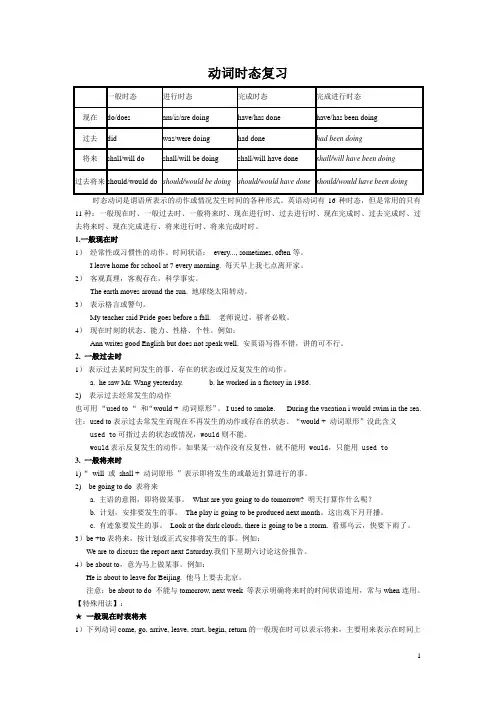
动词时态复习一般时态进行时态完成时态完成进行时态现在do/does am/is/are doing have/has done have/has been doing过去did was/were doing had done had been doing将来shall/will do shall/will be doing shall/will have done shall/will have been doing过去将来 should/would do should/would be doing should/would have done should/would have been doing时态动词是谓语所表示的动作或情况发生时间的各种形式。
英语动词有16种时态,但是常用的只有11种:一般现在时、一般过去时、一般将来时、现在进行时、过去进行时、现在完成时、过去完成时、过去将来时、现在完成进行、将来进行时、将来完成时时。
1.一般现在时1)经常性或习惯性的动作。
时间状语:every..., sometimes, often等。
I leave home for school at 7 every morning. 每天早上我七点离开家。
2)客观真理,客观存在,科学事实。
The earth moves around the sun. 地球绕太阳转动。
3)表示格言或警句。
My teacher said Pride goes before a fall.老师说过,骄者必败。
4)现在时刻的状态、能力、性格、个性。
例如:Ann writes good English but does not speak well. 安英语写得不错,讲的可不行。
2. 一般过去时1)表示过去某时间发生的事、存在的状态或过反复发生的动作。
a. he saw Mr. Wang yesterday.b. he worked in a factory in 1986.2) 表示过去经常发生的动作也可用“used to “和“would + 动词原形”。
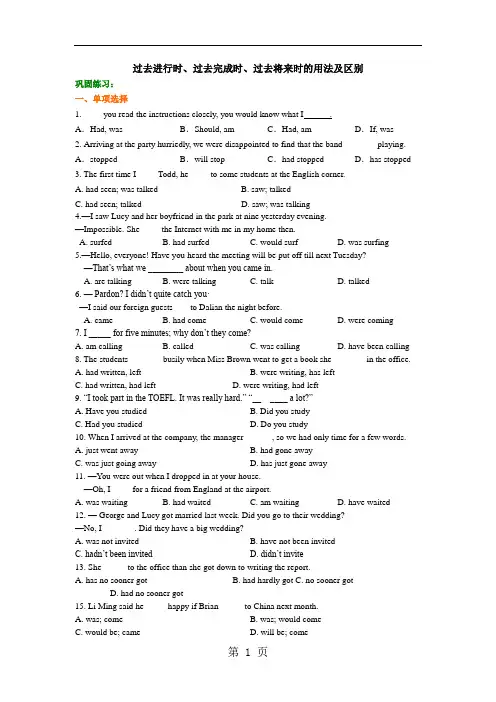
过去进行时、过去完成时、过去将来时的用法及区别巩固练习:一、单项选择1. ____ you read the instructions closely, you would know what I .A.Had, was B.Should, am C.Had, am D.If, was2. Arriving at the party hurriedly, we were disappointed to find that the band _______ playing. A.stopped B.will stop C.had stopped D.has stopped3. The first time I ____ Todd, he ____ to some students at the English corner.A. had seen; was talkedB. saw; talkedC. had seen; talkedD. saw; was talking4.—I saw Lucy and her boyfriend in the park at nine yesterday evening.—Impossible. She ____ the Internet with me in my home then.A. surfedB. had surfedC. would surfD. was surfing5.—Hello, everyone! Have you heard the meeting will be put off till next Tuesday?—That’s what we ________ about when you came in.A. are talkingB. were talkingC. talkD. talked6. —Pardon? I didn’t quite catch you·—I said our foreign guests ___ to Dalian the night before.A. cameB. had comeC. would comeD. were coming7. I _____ for five minutes; why don’t they come?A. am callingB. calledC. was callingD. have been calling8. The students _______ busily when Miss Brown went to get a book she _______ in the office.A. had written, leftB. were writing, has leftC. had written, had leftD. were writing, had left9. “I took part in the TOEFL. It was really hard.” “________ a lot?”A. Have you studiedB. Did you studyC. Had you studiedD. Do you study10. When I arrived at the company, the manager ______, so we had only time for a few words.A. just went awayB. had gone awayC. was just going awayD. has just gone away11. —You were out when I dropped in at your house.—Oh, I ____ for a friend from England at the airport.A. was waitingB. had waitedC. am waitingD. have waited12. — George and Lucy got married last week. Did you go to their wedding?—No, I _______. Did they have a big wedding?A. was not invitedB. have not been invitedC. hadn’t been invitedD. didn’t invite13. She _____ to the office than she got down to writing the report.A. has no sooner gotB. had hardly gotC. no sooner gotD. had no sooner got15. Li Ming said he _____happy if Brian _____ to China next month.A. was; comeB. was; would comeC. would be; cameD. will be; come二、完形填空阅读下列短文,掌握其大意,然后从1—20各题所给的四个选项(A、B、C和D)中,选出最佳选项。
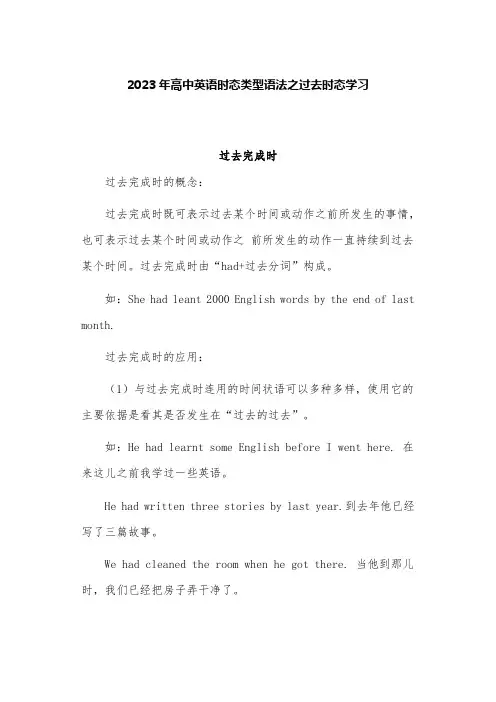
2023年高中英语时态类型语法之过去时态学习过去完成时过去完成时的概念:过去完成时既可表示过去某个时间或动作之前所发生的事情,也可表示过去某个时间或动作之前所发生的动作一直持续到过去某个时间。
过去完成时由“had+过去分词”构成。
如:She had leant 2000 English words by the end of last month.过去完成时的应用:(1)与过去完成时连用的时间状语可以多种多样,使用它的主要依据是看其是否发生在“过去的过去”。
如:He had learnt some English before I went here. 在来这儿之前我学过一些英语。
He had written three stories by last year.到去年他已经写了三篇故事。
We had cleaned the room when he got there. 当他到那儿时,我们已经把房子弄干净了。
He went there after he had finished his work. 他把事做完之后,就去哪儿了。
注意:当主句跟由before, after, as soon as所引导的时间从句的动作连接很紧密时,从句也可用一般过去时。
如:He went there after he read the letter. 他看了那封信后就去那儿了。
(2)过去完成时还经常用于主句为过去时的宾语从句中。
如:He said he had been a soldier. 他说他当过兵。
They said they had seen the film. 他们说这幕电影他们看过。
(3)在hardly/scarcely…when…,no sooner…than…两个结构中的主句通常要用过去完成时。
如:Hardly had I told her the news when she began to cry out. 她一听到这一消息就大哭了起来。
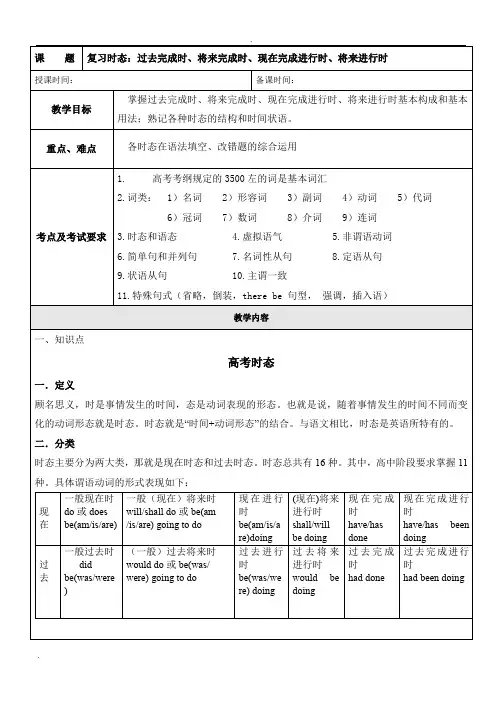
课后作业一、真题演练:单句语法1. When I die, I ____________(give) everything to you.2. That was definitely not an attractive idea, so I politely declined her invitation, .____________(close) m y book and walked away.3. His fear of failure __________(keep) him from classroom games that other students played with joyousabandon.4. _______________(speak) out your inner feeling won’t make you feel ashamed, on the contrary,5. _____________(complete) the project as planned, we’ll have to work two more hours a day.6.It was raining lightly when I___61___ (arrive) in Yangshuo just before dawn.7. This cycle 48 (go) day after day:The walls warm up during the day and cool off during the night and are thus always a timely offset(抵消) for the outside temperatures.8. In 1969,the pollution was terrible along the Cuyahoga River near Cleveland,Ohio.It 61 (be) unimaginable that it could ever be cleaned up.9. Be patient!Tai Chi 66 (call) “shadow boxing” in English.It asks you to act like water:10.Unless some extra money (find),the theatre will close11.When a new day breaks,the walls have given up their heat and are now cold enough 46 (cool) the house during the hot day;at the same time,they warm up again for the night.12. In addition to their simple beauty,what makes the adobe dwellings admirable is their ability to “air condition” a house wi thout 44 (use) electric equipment.13. The adobe dwellings(土坯房) 41 (build) by the Pueblo Indians of the American Southwest are admired by even the most modern of architects and engineers.二、单选题1. When I was young, I ________ with my grandma in the countryside, which is unforgettable.A. livedB. have livedC. was livedD. had lived2. –Excuse me, is the book Gone with the Wind by Margaret Mitchell available now?-Sorry, but it _________ so well that we don’t have any in store.A. sellsB. is soldC. has soldD. has been sold3. The tourism of Linyi _________ rapid growth over the last decade. Now it’s the second most visited city in Shandong Province.A. sawB. had seenC. is seeingD. has seen4. Great changes _____place in my hometown during the past three decades.A. tookB. have takenC. were takenD. have been taken5.Leave me alone. I ________ an article all the afternoon and haven’t finished yet.A. writeB. have been writingC. have writtenD. wrote6. When the power of love _______ the love of power, the world will likely be in peace.A. overcomesB. will overcomeC. is overcomingD. overcame7. Mr. Black ________ Shanghai in a few days. Shall we have a party?A. leavesB. is leavingC. leftD. has left8. –Look, it _________ again.–Yeah. This is the third snow we __________ this spring.A. will snow, are havingB. has snowed, had hadC. is snowing, have hadD. snows, have had9. Mr. White ____ in our school for nearly forty years before he retired last month.A. workedB. has workedC. had workedD. would work10. The project ________ to developing the economy and reducing poverty when it is completed.A. has contributedB. had been contributedC. will contributeD. is contributed11. Nelson Mandela __________ peacefully at his Johannesburg home on Thursday, President Jacob Zuma said.A. diesB. diedC. has diedD. was died12. –I thought you _____________ for vacation tomorrow.-I had planned, but I have a very important meeting to attend tomorrow.A. will leaveB. are leavingC. have leftD. were leaving13. Our manager ________for Shanghai in a few days and he has asked me to find out when the earliest plane ________ next Wednesday.A. is leaving, takes offB. will leave, is taking offC. leaves, will take offD. is to leave, is going to take off14. I’m calling about the apartment you ______the other day .Could you tell me more about it?A .advertised B. had advertised C. were advertising D. will advertise15. Whenever you______a present, you should think about it from the receiver’s point of view.A. boughtB. have boughtC. will buyD. buy16. I walked slowly through the market, where people ______ all kinds of fruits and vegetables. I studied the prices carefully and bought what I needed.A. sellB. were sellingC. had soldD. have sold17. The twins, who _______ their homework, were allowed to play badminton on the playground.A. will finishB. finishC. have finishedD. had finished18. The journey was tiring! All the seats in the train _______. I had to stand all the way.A. were occupiedB. would be occupiedC. would occupyD. had occupied19. Yesterday afternoon, I ______my homework when Mary called.A. had doneB. was doingC. would doD. am doing20. Close the door of fear behind you, and you ______ the door of faith open before you.A. sawB. have seenC. will seeD. are seeing21. Tommy is planning to buy a car. By next month ,he____ enough for a used one.A. saves B .saved C. will save D. will have saved22. She was surprised to find the fridge empty; the child _____ everything!A. had been eatingB. had eatenC. have eatenD. have been eating23. Despite the previous rounds of talks, no agreement______ so far by the two sides.A. has been reachedB. was reachedC. will reachD. will have reached24. More expressways _______in Sichuan soon to promote the local economy.A. are being builtB. will be builtC. have been builtD. had been built25 After school we went to the reading-room to do some reading, only to be told that it _____.A. was decoratedB. had decoratedC. had been decoratingD. was being decorated三、语法填空(共10小题;每小题1.5分,满分15分)阅读下面短文,在空白处填入1个适当的单词或括号内单词的正确形式。
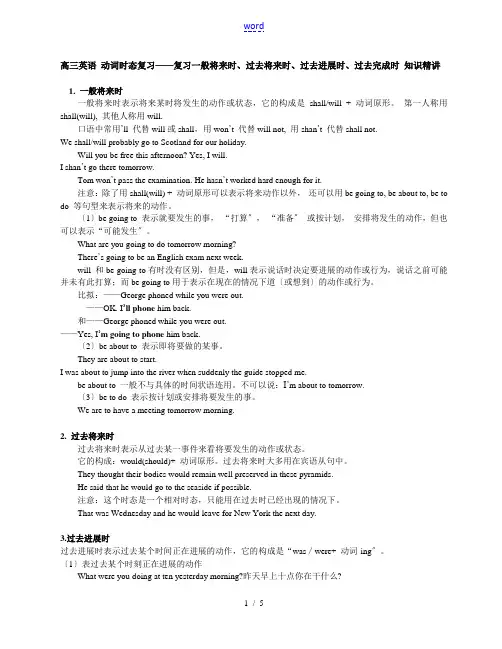
高三英语动词时态复习——复习一般将来时、过去将来时、过去进展时、过去完成时知识精讲1. 一般将来时一般将来时表示将来某时将发生的动作或状态,它的构成是shall/will + 动词原形。
第一人称用shall(will), 其他人称用will.口语中常用’ll 代替will或shall,用won’t 代替will not, 用shan’t 代替shall not.We shall/will probably go to Scotland for our holiday.Will you be free this afternoon? Yes, I will.I shan’t go there tomorrow.Tom won’t pass the examination. He hasn’t worked hard enough for it.注意:除了用shall(will) + 动词原形可以表示将来动作以外,还可以用be going to, be about to, be to do 等句型来表示将来的动作。
〔1〕be going to 表示就要发生的事,“打算〞,“准备〞或按计划,安排将发生的动作,但也可以表示“可能发生〞。
What are you going to do tomorrow morning?There’s going to be an English exam next week.will 和be going to有时没有区别,但是,will表示说话时决定要进展的动作或行为,说话之前可能并未有此打算;而be going to用于表示在现在的情况下道〔或想到〕的动作或行为。
比拟:——George phoned while you were out.——OK. I’ll phone him back.和——George phoned while you were out.——Yes, I’m going to phone him back.〔2〕be about to 表示即将要做的某事。
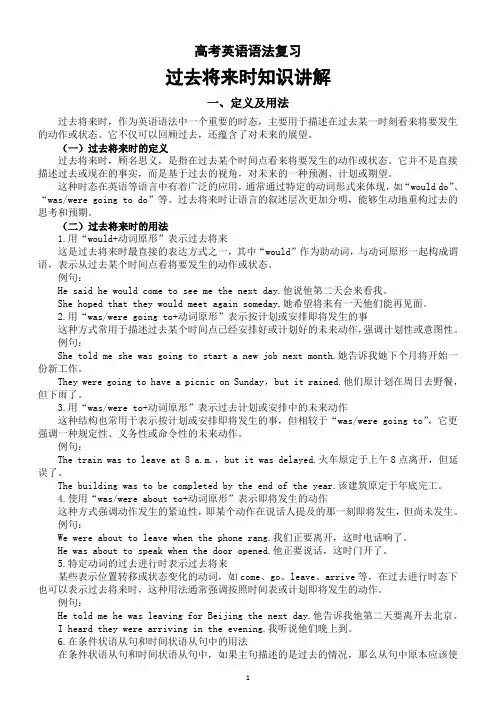
高考英语语法复习过去将来时知识讲解一、定义及用法过去将来时,作为英语语法中一个重要的时态,主要用于描述在过去某一时刻看来将要发生的动作或状态。
它不仅可以回顾过去,还蕴含了对未来的展望。
(一)过去将来时的定义过去将来时,顾名思义,是指在过去某个时间点看来将要发生的动作或状态。
它并不是直接描述过去或现在的事实,而是基于过去的视角,对未来的一种预测、计划或期望。
这种时态在英语等语言中有着广泛的应用,通常通过特定的动词形式来体现,如“would do”、“was/were going to do”等。
过去将来时让语言的叙述层次更加分明,能够生动地重构过去的思考和预期。
(二)过去将来时的用法1.用“would+动词原形”表示过去将来这是过去将来时最直接的表达方式之一,其中“would”作为助动词,与动词原形一起构成谓语,表示从过去某个时间点看将要发生的动作或状态。
例句:He said he would come to see me the next day.他说他第二天会来看我。
She hoped that they would meet again someday.她希望将来有一天他们能再见面。
2.用“was/were going to+动词原形”表示按计划或安排即将发生的事这种方式常用于描述过去某个时间点已经安排好或计划好的未来动作,强调计划性或意图性。
例句:She told me she was going to start a new job next month.她告诉我她下个月将开始一份新工作。
They were going to have a picnic on Sunday,but it rained.他们原计划在周日去野餐,但下雨了。
3.用“was/were to+动词原形”表示过去计划或安排中的未来动作这种结构也常用于表示按计划或安排即将发生的事,但相较于“was/were going to”,它更强调一种规定性、义务性或命令性的未来动作。
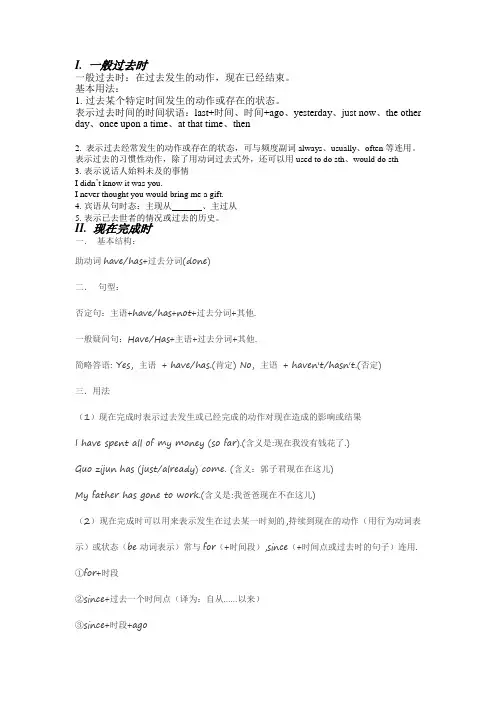
I. 一般过去时一般过去时:在过去发生的动作,现在已经结束。
基本用法:1.过去某个特定时间发生的动作或存在的状态。
表示过去时间的时间状语:last+时间、时间+ago、yesterday、just now、the other day、once upon a time、at that time、then2. 表示过去经常发生的动作或存在的状态,可与频度副词always、usually、often等连用。
表示过去的习惯性动作,除了用动词过去式外,还可以用used to do sth、would do sth3.表示说话人始料未及的事情I didn’t know it was you.I never thought you would bring me a gift.4.宾语从句时态:主现从、主过从5.表示已去世者的情况或过去的历史。
II. 现在完成时一.基本结构:助动词have/has+过去分词(done)二.句型:否定句:主语+have/has+not+过去分词+其他.一般疑问句:Have/Has+主语+过去分词+其他.简略答语: Yes, 主语+ have/has.(肯定) No, 主语+ haven't/hasn't.(否定)三.用法(1)现在完成时表示过去发生或已经完成的动作对现在造成的影响或结果I have spent all of my money (so far).(含义是:现在我没有钱花了.)Guo zijun has (just/already) come. (含义:郭子君现在在这儿)My father has gone to work.(含义是:我爸爸现在不在这儿)(2)现在完成时可以用来表示发生在过去某一时刻的,持续到现在的动作(用行为动词表示)或状态(be动词表示)常与for(+时间段),since(+时间点或过去时的句子)连用.①for+时段②since+过去一个时间点(译为:自从……以来)③since+时段+ago④主句(现在完成时)since+从句(一般过去时)→主完从过●⑤It is/ has been +时段+since+从句(过去时)Mary has been ill for three days.I have lived here since 1998.⑥It is + 第几次(the first time)that + 句子(现在完成时)四. has gone (to),has been (to), has been (in) 的区别Have/Has gone(to) :去了(现在不在说话现场)Where is your father?He has gone to Shanghai.Have/Has been (to) :去过(已不在去过的地方)My father has been to Shanghai.Have/has been in:呆了多久(还在所呆的地方)My father has been in Shanghai for two months. /since two months ago. 五.现在完成时的标志1. 现在完成时的含义之一是过去完成的动作对现在仍有影响,用以下四大标志词可以表达这种含义:* 以already, just和yet为标志He has already got her help. 他已得到她的帮助。
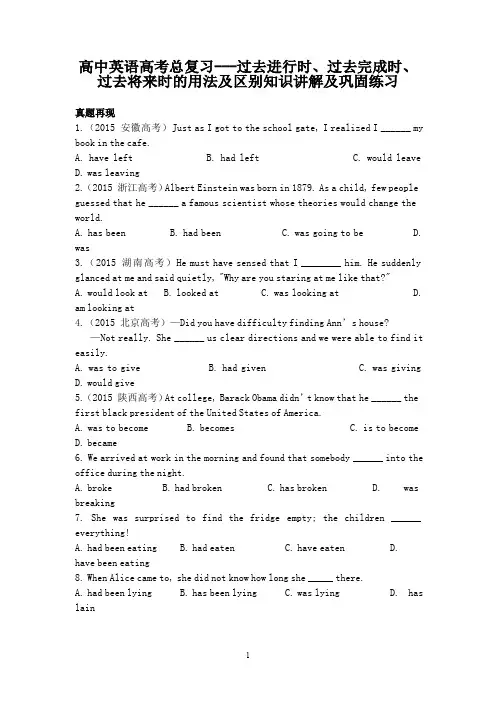
高中英语高考总复习---过去进行时、过去完成时、过去将来时的用法及区别知识讲解及巩固练习真题再现1.(2015安徽高考)Just as I got to the school gate,I realized I______my book in the cafe.A.have leftB.had leftC.would leaveD.was leaving2.(2015浙江高考)Albert Einstein was born in1879.As a child,few people guessed that he______a famous scientist whose theories would change the world.A.has beenB.had beenC.was going to beD. was3.(2015湖南高考)He must have sensed that I________him.He suddenly glanced at me and said quietly,"Why are you staring at me like that?"A.would look atB.looked atC.was looking atD. am looking at4.(2015北京高考)—Did you have difficulty finding Ann’s house?—Not really.She______us clear directions and we were able to find it easily.A.was to giveB.had givenC.was givingD.would give5.(2015陕西高考)At college,Barack Obama didn’t know that he______the first black president of the United States of America.A.was to becomeB.becomesC.is to becomeD.became6.We arrived at work in the morning and found that somebody______into the office during the night.A.brokeB.had brokenC.has brokenD.was breaking7.She was surprised to find the fridge empty;the children______ everything!A.had been eatingB.had eatenC.have eatenD. have been eating8.When Alice came to,she did not know how long she_____there.A.had been lyingB.has been lyingC.was lyingD.has lain答案与解析:1.B,我意识到把书落在咖啡店里了,落书的动作发生在意识到之前,所以应该使用过去完成时态。
(英语)高考英语总复习--过去将来时含解析一、单项选择过去将来时1.When Peter __________ the car door, he found the key left in his car. So he had to call for help.A.opened B.was opening C.was to open D.had opened【答案】C【解析】试题分析:句意:当皮特刚想打开门时,发现钥匙忘在了车里,因此他不得不求助。
因为皮特他没有钥匙,想打开门还未打时,表将来,只有be to do 可以表将来,故选C。
考点:考查动词的时态的用法。
点评:本题难度适中。
动词的时态是高中语法知识点的重难之一,需要考生掌握各种时态的用法,有分析理解复杂的句子结构及语境的能力。
即学即练:She said a new bookshop_______ in the high street.A. openedB. was openingC. was to openD. had opened解析:D。
句意:她说在商业大街上有新开了一家书店。
2.Every time they met, they ____ talk about former classmates they remembered.A.could B.would C.should D.will【答案】B【解析】【详解】考查时态。
句意:每次见面,他们都会聊起以前的同学。
根据句意可知,every time引导的时间状语从句中用一般过去时代替过去将来时,主句则使用过去将来时,故选B。
3.We had to be patient because it ________some time________ we got the full results. A.has been;since B.had been;untilC.was;after D.would be;before【答案】D【解析】D解析在“it+be+一段时间+before/after/since+从句”句型中,before从句中的动作经过一段时间后才会实现;after从句中的动作发生后已经过去了一段时间;since从句中的动作完成后到现在已经有一段时间了。
巩固练习:一、单项选择1. (2015届高陕西省西安地区八校高三下学期联考)____ you read the instructions closely, you would know what I .A.Had, was B.Should, am C.Had, am D.If, was2. (2015届湖南省高三十三校联考第二次考试) Arriving at the party hurriedly, we were disappointed to find that the band _______ playing.A.stopped B.will stop C.had stopped D.has stopped 3. (2015届重庆市巴蜀中学高三下学期第二次模拟考试) The first time I ____ Todd, he ____ to some students at the English corner.A. had seen; was talkedB. saw; talkedC. had seen; talkedD. saw; was talking4.—I saw Lucy and her boyfriend in the park at nine yesterday evening.—Impossible. She ____ the Internet with me in my home then.A. surfedB. had surfedC. would surfD. was surfing5.—Hello, everyone! Have you heard the meeting will be put off till next Tuesday?—That’s what we ________ about when you came in.A. are talkingB. were talkingC. talkD. talked6. —Pardon? I didn’t quite catch you·—I said our foreign guests ___ to Dalian the night before.A. cameB. had eC. would eD. were ing7. I _____ for five minutes; why don’t they e?A. am callingB. calledC. was callingD. have been calling8. The students _______ busily when Miss Brown went to get a book she _______ in the office.A. had written, leftB. were writing, has leftC. had written, had leftD. were writing, had left9. “I took part in the TOEFL. It was really hard.” “________ a lot?”A. Have you studiedB. Did you studyC. Had you studiedD. Do you study10. When I arrived at the pany, the manager ______, so we had only time for a few words.A. just went awayB. had gone awayC. was just going awayD. has just gone away11. —You were out when I dropped in at your house.—Oh, I ____ for a friend from England at the airport.A. was waitingB. had waitedC. am waitingD. have waited12. — George and Lucy got married last week. Did you go to their wedding?—No, I _______. Did they have a big wedding?A. was not invitedB. have not been invitedC. hadn’t been invitedD. didn’t invite13. She _____ to the office than she got down to writing the report.A. has no sooner gotB. had hardly gotC. no sooner gotD. had no sooner got15. Li Ming said he _____happy if Brian _____ to China next month.A. was; eB. was; would eC. would be; cameD. will be; e二、完形填空阅读下列短文,掌握其大意,然后从1—20各题所给的四个选项(A、B、C和D)中,选出最佳选项。
高三英语过去完成进行时与将来完成时知识点归纳一、过去完成进行时(一)构成:过去完成进行时是由had been +现在分词构成。
She had been suffering from a bad cold when she took the exam. 她在考试之前一直患重感Had they been expecting the news for some time? 他们期待这个消息有一段时间了吧?(二)用法:1. 表示过去某一时间之前一直进行的动作。
过去完成进行时表示动作在过去某一时间之前开始,一直延续到这一过去时间。
和过去完成时一样,过去完成进行时也必须以一过去时间为前提。
过去完成进行时也是一个相对的时态, 上下文中须有明示或暗示的作为参照的过去的时间。
I had been looking for it for days before I found it. 这东西我找了好多天才找着。
They had only been waiting for the bus a few minutes when it came. 他们只等了几分钟车就来了。
2. 表示反复的动作。
He had been mentioning your name to me. 他过去多次向我提到过你的名字。
3. 过去完成进行时还常用于间接引语中。
The doctor asked what he had been eating. 医生问他吃了什么。
I asked where they had been staying all those days. 我问他们那些天呆在哪儿。
4. 过去完成进行时之后也可接具有突然之意的when分句。
I had only been reading a few minutes when he came in. 我刚看了几分钟他就进来了。
She’d only been reviewing her lessons for a short while when her little sister interrupted her.她温习功课才一会儿,她妹妹就打断她了。
巩固练习一、单项选择1. My uncle ______ in Taiwan for 20 years. Now he has settled down in mainland.A. 1ivedB. had livedC. has livedD. was living2. By the time you have completed the essential training, you ______ exposed to virtually every new feature of the course.A. areB. will have beenC. have beenD. will be3. I’m sure you will do better in the test because you ____ so hard this year.A. studiedB. had studiedC. will studyD. have been studying4. You fool! You could have got a house full of wonderful food, but you only _____ for a cake.A. were to wishB. wishedC. have wishedD. had wished5. —Since you have agreed to go with us, why aren’t you getting ready?—But I _____ that you’d have me start immediately.A don’t realize B. didn’t realize C. hadn’t realized D. haven’t realized6. Mr. Irving, who _____ in a high school for forty years, is now living retirement.A. has taughtB. taughtC. had taughtD. has been teaching7. She ____ on a new novel ever since this summer and it is supposed to ____ at the beginning of 2013.A. had worked; be publishedB. had been working; have publishedC. has worked; publishD. has been working; be published8. Tom is now in our class, but he once ____ in WestbrookHigh School for a term.A. has studiedB. studiedC. had studiedD. studies9. Someone _______ his car in front of my house and it is blocking my driveway.A. had parkedB. was parkingC. parkedD. has parked10. In the past twelve months the research members _________the effectiveness of many materials in a home building.A. had studiedB. would studyC. studiedD. have studied11. To Our disappointment, the trip we had been looking forward to ____ in the pouring rain.A. startingB. startC. to startD. started12. I ____ you not to give up that job — now, where can you find a better one?A. toldB. were tellingC. had toldD. tell13. The big city has always been the dream career destination of college students. But lately a trend of heading back home ____ a part of future job considerations.A. has becomeB. had becomeC. becomesD. will become14. Sorry, I’m late. The car ____ down on my way here.A. was breakingB. has brokenC. had brokenD. broke15. Nowadays no one seems to show any interest in his novel, which, though, ____ a best seller.A. had beenB. wasC. has beenD. would be16. Now that we _____ all the money, it’s no use turning on me and saying it’s all my fault.A. had lostB. lostC. have lostD. lose17. —Sir, I’m here.—P1ease listen. I _____ asking your parents to come to our school, but I'd like to hear your opinion first.A. have consideredB. am going to considerC. consideredD. have been considering18. —You may find the key to the maths problem on page 107.—Ah, it’s so simple. I wonder why I ____ of that.A. hadn’t thoughtB. haven’t thoughtC. didn’t thinkD. wasn’t thinking19. Collecting stamps as a hobby ____ increasingly popular during the past fifty years.A. becomesB. becameC. has becomeD. had become20. —Better not throw waste paper here and there.—I’m so sorry, but I ____ the waste paper basket.A. won’t seeB. wasn’t seeingC. didn’t seeD. don’t see二、完形填空Spring of 1995 was a strangely hot spring. I was 9 months pregnant(怀孕)with my first daughter and needed to 1 about 45 minutes from a very rural area to my 2 office. I drove an older car, which wasn’t in the greatest of 3 . On this particular day, I wasn’t 3 miles away from my 4 when the radiator tube blew on the car.Only a minute after I stopped on the side of the road, a semi (半拖货运车) 5 behind me to see if I needed help. I explained to him that I had to make my 6 . “Well, the car can’t be 7 now. I will take you into town 8 you can get to your doctor appointment, ”he replied. He had a load of soybeans that he was 9 to the same town and said that he would make the 10 after he had taken me to the doctor’s office. To my 11 , he walked me into the doctor’s office and 12 for me in the waiting area. The nurse asked if my husband would like to 13 us for the exam. I had to 14 because this kind man’s face turned red and told her that he was 15 the driver. After all this, he took me back to my car, went and 16 my husband up from work, took him to get the 17 for the car and then helped to fix it! Though I tried to offer him 18 for all he had done for us that day, he 19 take a dime. All he said was“That is what people do, they help each other.”When I see people in the same 20 today. I do as he so kindly demonstrated:help in whatever way I can.1. A. wait B. walk C. drive D. sit2. A. doctor’s B. husband’s C. boss’s D. father’s3. A. speed B. price C. color D. shape4. A. office B. home C. factory D. hospital5. A. hit upon B. passed off C. pulled up D. broke down6. A. appointment B. fortune C. living D. mark7. A. stopped B. moved C. bought D. fixed8. A. but B. so C. or D. unless9. A. selling B. transporting C. planting D. harvesting10. A. delivery B. way C. change D. car11. A. disappointment B. sorrow C. satisfaction D. surprise12. A. looked B. waited C. cooked D. asked13. A. watch B. help C. join D. prepare14. A. laugh B. apologize C. complain D. argue15. A. hardly B. almost C. completely D. only16. A. called B. kept C. picked D. cheered17. A. engine B. part C. fuel D. wheel18. A. payment B. thanks C. smiles D. gifts19. A. couldn’t B. shouldn’t C. mustn’t D. wouldn’t20. A. age B. road C. situation D. health三、阅读理解Employment for AdultsSchool food service employment offers a Monday through Friday work schedule with time off when children are not in school. We have a variety of short-hour positions, with flexible hours, NO EVENINGS OR WEEKENDS.Training is provided for a variety of duties. These duties may include preparing items for a salad bar, operating a commercial dishwashing machine, even managing an outside snack cart on campus. Knowledge of or the ability to be trained in cash handling is a must for employment at the junior and senior high level. Our computerized cash accounting system could afford you the opportunity to become familiar with computers. Advancement opportunities are available.Apply for part-time positions at the Food and Nutrition Department, 143 South Alma School Road. We are between Broadway and Main on the east side of Alma School Road. We can be reached by calling (480)472-0900.Employment for StudentsThe Food and Nutrition Department of Mesa Public School employs students to work in the school cafeteria. Student employees learn food service skills that help them gain an edge in the “real”work environment. They learn to prepare and serve food as well as operate a computerized point of sale system.Student employees must meet the following minimum qualifications:●Must be at least 14 years old.●Grade of A/B in math.●Must have less than five absences during the previous school year.●Must be able to count change accurately or have the ability to learn.●Must be able to take direction and follow orders.●Must be extremely honest and loyal.Please visit the cafeteria manager for more information.ALL EMPLOYMENT CANDIDA TES:To work in the cafeteria you must obtain a Food Service Worker License issued by MaricopaCounty. The licenses are required for any person who handles, prepares, serves, or sells food for human consumption, including those whose duties are restricted to busing or washing dishes. New workers must obtain their licenses within 30 days of hire.1. All the employees don’t have to work ________.A. in the afternoonB. on weekendsC. on weekdaysD. in the day time2. Which of the following is NOT included in the training programme?A. How to wash dishes.B. How to prepare salad.C. How to sell snacks on campus.D. How to manage one’s personal finances.3. To work as a student employee, one is supposed to ________.A. do well in mathB. have work experienceC. operate computers skillfullyD. have a good academic report4. The purpose of the text is to _______.A. offer some part-time and full-time jobsB. show the importance of school cafeteriaC. advertise for school food service employmentD. list the requirements for some vacant positions四、短文改错In my village a lot of children were leaving school for various reason.Some families are too poor to send their children to school, and they have to earn money to support their families.Many parents do not think it useless to send their children to school.They would rather let their children to stay at home.I feel worried this.I think every child should have a chance to go to school.We should pay many attention to the education of children, for we will play an important part in our socialist construction in the future.Ways must be found prevent children from leave off their studies.五、书面表达当前有些农村儿童的家长为了给孩子们的将来创造更好的条件,远离家乡到城里去打工,请你以“如何关心农村留守儿童(leftover children)的成长?”为主题发表看法。
巩固练习:一、单项选择1. (2015届高陕西省西安地区八校高三下学期联考)____ you read the instructions closely, you would know what I .A.Had, was B.Should, am C.Had, am D.If, was2. (2015届湖南省高三十三校联考第二次考试) Arriving at the party hurriedly, we were disappointed to find that the band _______ playing.A.stopped B.will stop C.had stopped D.has stopped 3. (2015届重庆市巴蜀中学高三下学期第二次模拟考试) The first time I ____ Todd, he ____ to some students at the English corner.A. had seen; was talkedB. saw; talkedC. had seen; talkedD. saw; was talking4.—I saw Lucy and her boyfriend in the park at nine yesterday evening.—Impossible. She ____ the Internet with me in my home then.A. surfedB. had surfedC. would surfD. was surfing5.—Hello, everyone! Have you heard the meeting will be put off till next Tuesday?—That’s what we ________ about when you came in.A. are talkingB. were talkingC. talkD. talked6. —Pardon? I didn’t quite catch you·—I said our foreign guests ___ to Dalian the night before.A. cameB. had eC. would eD. were ing7. I _____ for five minutes; why don’t they e?A. am callingB. calledC. was callingD. have been calling8. The students _______ busily when Miss Brown went to get a book she _______ in the office.A. had written, leftB. were writing, has leftC. had written, had leftD. were writing, had left9. “I took part in the TOEFL. It was really hard.” “________ a lot?”A. Have you studiedB. Did you studyC. Had you studiedD. Do you study10. When I arrived at the pany, the manager ______, so we had only time for a few words.A. just went awayB. had gone awayC. was just going awayD. has just gone away11. —You were out when I dropped in at your house.—Oh, I ____ for a friend from England at the airport.A. was waitingB. had waitedC. am waitingD. have waited12. — George and Lucy got married last week. Did you go to their wedding?—No, I _______. Did they have a big wedding?A. was not invitedB. have not been invitedC. hadn’t been invitedD. didn’t invite13. She _____ to the office than she got down to writing the report.A. has no sooner gotB. had hardly gotC. no sooner gotD. had no sooner got15. Li Ming said he _____happy if Brian _____ to China next month.A. was; eB. was; would eC. would be; cameD. will be; e二、完形填空阅读下列短文,掌握其大意,然后从1—20各题所给的四个选项(A、B、C和D)中,选出最佳选项。
Years ago when I first heard “empty nest”, i t sounded like a pleasant position to be in. I had three small kids and the 1 of waking up in the morning ___2___ rested, instead of having my eyes opened by tiny fingers, was quite 3 .Oh, the beauty of dinnertime without spilled milk, a house without sounds of __4_, and walls without sticky fingerprints. I could 5 a shopping cart(手推车)that was filled with groceries instead of children!However, when I 6 that sought-after goal, it was rather a 7 . It no longer looked attractive because these years had 8 the distasteful parts of motherhood. For some time, no one had been crying to be 9 in the middle of the night. 10 needed to be dressed or have their shoes tied ten times a day. Just when the children became pleasant 11 , they moved out. Is there no justice?I tried not to look into the three empty bedrooms as I passed by them. School books, papers, and toys had all 12 . When I finally moved out of my depression, I 13 my dear husband, Jack, looking almost the same as when I had fallen 14 Lin love with him. Except for showing a bit of 15 , the years had been good to him. I caught myself 16 when I realized the creases(皱纹)on his face were smile lines, not 17 wrinkles.Well my nest was not empty after all. It still 18 the one special person I had chosen to share my life with. In the quiet of the empty nest, it might be 19 for us to find each other. 1 wondered if maybe we could restart the passion we had. And then, 20 to answer my unspoken question, he looked at me and winked(眨眼示意).1. A. opinion B. thought C. mind D. view2. A. slowly B. partially C. fully D. freshly3. A. annoying B. amusing C. exciting D. appealing4. A. crying B. 1aughing C. talking D. singing5. A. force B. pull C. push D. drag6. A. stretched B. approached C. extended D. reached7. A. surprise B. disappointment C. pleasure D. shock8. A. passed B. solved C. involved D. explained9. A. fed B. watched C. protected D. treated10. A. Somebody B. Nobody C. Anybody D. Everybody11. A. friends B. partners C. pany D. groups12. A. existed B. 1eft C. faded D. disappeared13. A. watched B. observed C. recognized D. noticed14. A. early B. quickly C. wildly D. widely15. A. wear B. sorrow C. suffering D. anxiety16. A. shouting B. reflecting C. smiling D. relaxing17. A. worry B. relief C. regret D. fight18. A. 1iked B. held C. supported D. 1ived19. A. smarter B. harder C. easier D. 1ater20. A. even if B. although C. as D. as if三、阅读理解(2015 福建省高三毕业班质量检查)The world has a fast growing population and people need more land for houses, factories, highways, and so on. The farmland is decreasing with each passing day. How to meet the need of feeding the growing population? One way is to introduce some high-output gene into a crop to enable it to produce more. Biologists over the years have discovered genes which can raise output of the crops, resist pests, improve taste, etc.However, in many western countries there is widespread concern over the safety of“Genetically Modified”(GM) (转基因)foods, because they think there may be serious problems of environment, health, safety, morality and so on.As a scientist I must admit GM foods involve great risks to humans. In fact in Europe they’re called “Frankenstein foods” by many. Frankenstein is a character in a novel. He was a very clever scientist. He created a monster(怪物), which eventually killed him.Soybeans can be made into many foods. However, it’s hard to trace them. Therefore, it’s very important we have to make sure the soybean, if genetically modified, is free from any poisonous matter harmful to human beings. For this we need very good testing. We do have some testing on some animals, but no pletely satisfactory testing has ever been made so far. They’re entirely new, and their problems are entirely unknown. It takes time to develop persuasive tests to know whether they’re harmful to us or not.We may not be able to tell what may happen if we take GM foods. Some of them may be resistant to antibiotics (抗生素). Then many of the medicines we have today will have no effect on people eating GM foods.A more likely case is the GM foods may contain genes some people are allergic to. GM products have already e into our lives but most people even know nothing about it.At least we have to be clear about what we are eating. The China Consumers Association is calling for labeling (标注) on GM foods so that consumers will know before they buy them.1. The chief purpose of developing GM foods is to_______.A. feed the fast growing populationB. make the foods much cheaperC. make the foods much tastierD. kill pests on the crops2. From the passage we can infer that _____.A. many Europeans reject GM foodsB. GM foods are very popular in EuropeC. Frankenstein foods can make people cleverD. Frankenstein was a scientist creating GM foods3. The underlined phrase “trace them” in Paragraph 4 probably means“_________”.A. find their marketB. raise their qualityC. find their originsD. enjoy their taste4. Which of the following is TRUE about GM foods?A. The testing shows GM soybean foods are free from poisonous matter.B. Sometimes consumers can hardly tell GM soybeans from natural ones.C. GM foods prove to be safe to humans after some testing on animals.D. GM foods problems have been known after testing on animals.5. What can we learn from the passage?A. GM foods make antibiotics fail to function properly.B. People eating GM foods will suffer from food allergies.C. As GM foods are safe at present, they’re certainly safe later on.D. People should be informed of which foods are GM foods.四、短文改错下面短文中共有10处错误,错误涉及一个词的增加、删除或修改。